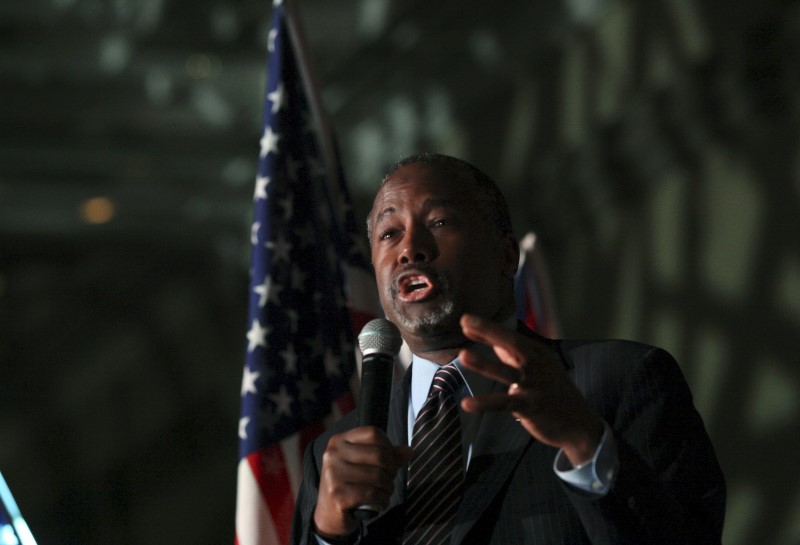By Susan Cornwell
WASHINGTON (Reuters) - Republican presidential candidate Ben Carson on Sunday pushed back against media reports questioning his veracity, even as rival Donald Trump asserted Carson needed to explain a number of things he has said regarding recollections about West Point and his youth.
Carson, a favorite of conservative activists, is neck-and-neck with Trump at the top of Republican primary polls a year before the November 2016 presidential election.
But last week Carson faced media stories that he had misrepresented details surrounding a scholarship offer to the Army's prestigious U.S. Military Academy at West Point, New York, as well as other tales from his youth in inner-city Detroit and college life.
Carson told ABC's "This Week" news show on Sunday that the West Point website uses the word "scholarship," so that he was not wrong to use this word in the past when describing overtures from military officials who told him when he was young that they could get him a "full scholarship" to the academy.
He said he was flattered by the suggestions but had already decided to go to college and medical school.
Carson also said his campaign had been able to find an article from the Yale Daily News that would back up statements he made about a psychology class he took in college. He told CBS's "Face the Nation" that "it will be coming out within the next day or two, showing what happened with that psychology course."
In his 1990 autobiography, "Gifted Hands," Carson, a 64-year-old retired neurosurgeon, wrote about the offers of a West Point scholarship and of later being labeled the most "honest student" in a psychology course at Yale.
He said he was photographed by the Yale Daily News at the time, but the Wall Street Journal challenged this on Friday, saying no photo identifying Carson as a student ran in the student newspaper.
Trump raised questions about Carson's accounts of his past on four different Sunday talk shows, calling Carson's tales "strange" and "weird" in a conversation with ABC's "This Week."
"He's going to have to explain a lot of things away," Trump told NBC's "Meet the Press."
Carson did not address the questions about his veracity during an appearance on Sunday in Puerto Rico.
The questions about his account of the West Point scholarship arose last week after a report by political news website Politico, which said Carson never applied to nor was he admitted to the taxpayer-funded academy.
But some media critics have questioned the way Politico ran its initial story, which said Carson's campaign had admitted he "fabricated" a "full scholarship" from West Point. Carson then denied that his campaign's statement constituted such an admission, and Politico's story and headline were changed to reflect that.
A check of the West Point website shows it uses the words "full scholarship" under "admissions information."

"As a cadet, you are a member of the U.S. Army and receive a full scholarship and an annual salary of more than $10,000 from which you pay for your uniforms, textbooks, a laptop computer, and incidentals," it says.